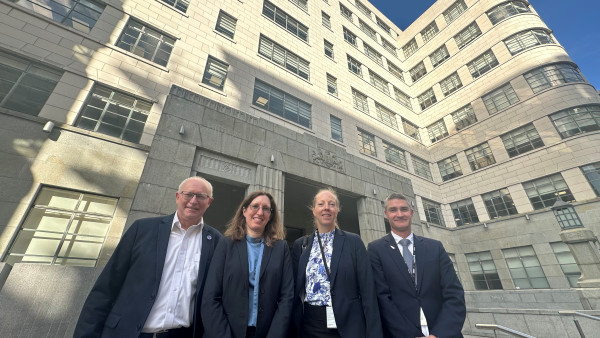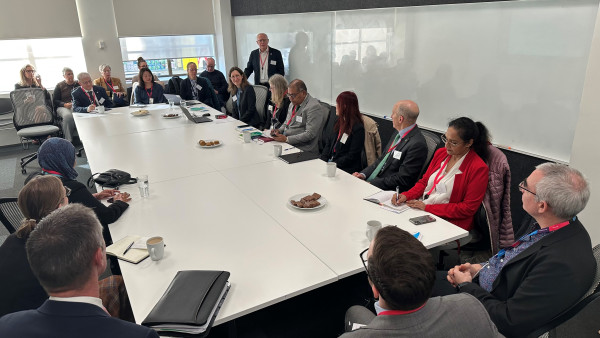IEC visit connects industry guests with IEC leadership
We welcomed Katherine Fraga Pearson, Director of Membership, Affiliates & Capacity Building with International Electrotechnical Commission (IEC), and 20 professionals from across metrology, energy efficiency, electrical engineering, health data, policy, and health and safety sectors.

IEC National Committee President Peter Berry, IEC guest from Geneva Katharine Fraga Pearson, Senior Advisor International Engagement Camilla Ojansivu and Standards NZ National Manager Malcolm MacMillan.
Guests joined a round table discussion on how standards could benefit their work and learned of the IEC's priority areas of focus. The event was a reminder of New Zealand’s influence in the global standards community and the opportunities that lie ahead for industry to get involved in shaping standards. Peter Berry, President of the IEC National Committee of New Zealand, emphasized the importance of topics being addressed with standards under development: climate change, resilience, asset renewal, smart technologies, and artificial intelligence. These are pressing issues not just for New Zealand, but for countries around the world, and the IEC provides a vital platform for sharing knowledge and shaping solutions that are globally informed but locally relevant.
“Every country is facing the same challenges,” he said. “The IEC gives us a platform to learn from others and contextualize those solutions for New Zealand.”
Why standards matter more than ever
Based out of Geneva, Switzerland, where the IEC’s headquarters are based, Katherine Fraga Pearson’s role takes her across the world acting as a conduit for both the IEC and its member-nation representatives. She presented on how standards are becoming the delivery mechanism for quality, safety, and innovation in a rapidly changing world, emphasizing that participation in the IEC is not just about compliance, it’s about shaping the future.
‘When everything is working, you don’t think about standards, but they’re what make systems reliable and impactful,’ she said, ‘If you’re involved, you’re helping shape the future and not just for your country, but for others around the world.’
National committees through subject specialist technical committees, she explained, are evolving into development agencies that connect government policy with on-the-ground technology. By aligning with international standards, New Zealand gains access to over 170 other markets, enabling local innovations to scale globally.

Empowering future standards makers
Katharine introduced the IEC’s new online standards development platform, which allows experts to contribute and comment with other experts directly online without necessarily attending technical committee meetings. This digital shift is making it easier for more people to engage, comment, and contribute.
The IEC is also working on smarter tools to integrate standards into users’ workflows, making them more accessible and user-friendly targeting the users’ needs. Talking of future aspirations for standards and digital access she says, ‘We’d like to get to a stage where you don’t need to know the number of a standard anymore. Just describe the problem you’re trying to solve, and you would get a range of solutions.’
Learning remained a priority, especially in engaging and empowering industry to play their part. Public webinars, learning modules, and bespoke training are all part of the IEC’s effort to deepen stakeholder engagement as are already existing IEC’s resources that can help others to be informed and get involved:
IECs online learning platform(external link)
Standards in Action: From AI to Humanitarian Impact
The IEC is actively involved in shaping standards for emerging technologies like AI, hydrogen energy, and renewable systems. Katharine highlighted the importance of building safety and sustainability into these innovations from the outset.
She also shared inspiring examples of IEC standards being applied in humanitarian projects, such as photovoltaic and battery reuse systems in Kenya and rural Asia. These initiatives demonstrate how standards can enhance resilience, safety, and sustainability in real-world settings.
Collaboration, climate action, and the future
Katharine emphasized the IEC’s collaboration with ISO, ITU, and other standards organisations to support climate action and digital transformation. She highlighted the upcoming AI Summit in Korea and the IEC Annual General Meeting in New Delhi, which will focus on fostering a sustainable world.
The Young Professionals Programme was also spotlighted as a key initiative to bring fresh thinking into the standards community. A recent bootcamp challenged participants to develop a standard in a day, demonstrating the challenges faced and considerations required in the development process and also the power of digital tools and new perspectives.
A call to action
The session concluded with a call to increase New Zealand’s participation in IEC activities. While currently active on 11 committees, New Zealand observes on over 100, highlighting the potential for deeper engagement.
In his closing remarks, Peter Berry emphasized the importance of engaging with the electrotechnical community to ensure better outcomes for New Zealand, particularly in terms of safety, quality, and interoperability.
‘How do we get the most effective, efficient, and consumer-friendly outcomes for our community?” he asked. “To do that, we need our experts.’
Peter noted that while standards work has traditionally focused on highly technical areas like transformers, there is now a growing emphasis on systems-level thinking. Interoperability, he said, gives New Zealand a head start in global markets.
He encouraged attendees to explore how standards can be used within their own organisations to drive meaningful outcomes and offered to speak further with anyone interested.
If you work in electrotechnical-related industry, standardisation or systems management, you could help shape tomorrow’s international standards (IEC and ISO) and be part of ensuring that New Zealand’s voice is heard globally. You can make an expression of interest to join a technical committee or even apply to join the New Zealand IEC National Committee which oversee New Zealand’s involvement in the IEC.
Learn more here:
